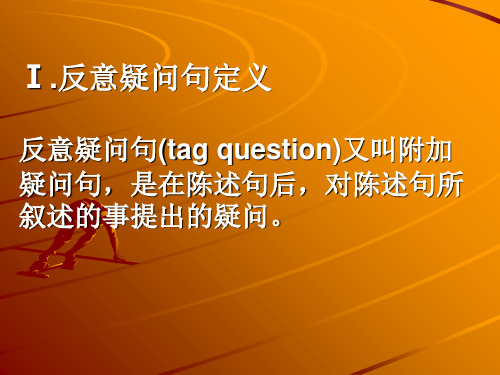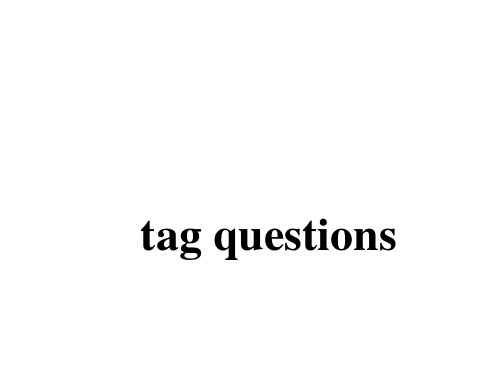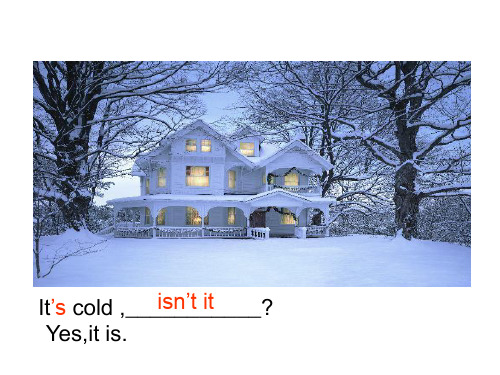反义疑问句PPT课件
合集下载
反意疑问句ppt课件

• Jack wasn’t playing soccer, _w__a_s _h_e___? • Their parents have gone to London,
__h_a_v_e_n_’_t t_h_e_y__? • I have never been to the park, __h_a_v_e_n’_t_I__? • You have a good friend, __d_o_n_’t_y_o_u___? • We had a meeting, __d_i_d_n_’t_w_e___?
Grammar: 反意疑问句
一、定义:
当我们陈述了一个事实,而又不是很 有把握,就可以在陈述句后加一个简 短问句,称为反意疑问句。它表示提 问人的看法,没有把握,需要对方证 实。反义疑问句由两部分组成:前一 部分是一个陈述句,后一部分是一个 简短的疑问句,两部分的人称时态应 保持一致。
二、结构:
结构一: 前肯,+ 后否 eg. She is a student, isn’t she?
结构二: 前否,+ 后肯 eg. She isn’t a student, is she?
三、反意疑问句的解答步骤
1. 判定(判断该用肯定还是否定); 2. 找动(找句子的助动词:be用be,动词原形do, 三单does,过去did,完成have); 3. 换代(将主语换为人称代词);
2. 一般动词(play, study, watch 等)句型:
现在 主语+play/plays…, don’t (doesn’t) + 主语? 过去 主语+played…, didn’t + 主语?
1 Your mother likes cooking ,_d__o_e_s_n_’t_s_h_e___? 2 He has an apple, __d_o_e_s_n_’_t _h_e____? 3 The plane took off an hour ago, __d_i_d_n_’t_i_t___? 4 He didn’t go to school late this morning,
完整反义疑问句课件

如果陈述句是肯定的,反义疑问句应该是否定的。
2 人称一致
陈述句和反义疑问句中的主语和动词人称要保持一致。,避免使用复杂的句子结构。
结束语
通过学习反义疑问句的结构和用法,我们可以更好地理解和运用这个表达方 式,提升我们的语言表达能力。
完整反义疑问句PPT课件
PPT介绍反义疑问句
什么是反义疑问句?
反义疑问句是指一种用于提问或表示疑问的句子结构,通常由一个陈述句和一个反义疑问句构成。
反义疑问句的结构
1
陈述句部分
包含陈述句的主谓宾结构
2
反义疑问句部分
由一个助动词和一个否定词构成
3
连接词
连接陈述句和反义疑问句的部分,常用的连接词包括but和yet
反义疑问句的语气和语调
语气
反义疑问句通常用于表示疑问、请求或强调某 种认可的语气。
语调
反义疑问句通常以升调结尾,以引起对方的回 答或注意。
反义疑问句的用法与例句
询问意见
这个计划听起来很好,不是吗?
表示认可
你很喜欢这部电影,对吗?
确认信息
你不会去参加聚会,对吗?
反义疑问句的注意事项
1 肯定陈述,否定反义疑问
2 人称一致
陈述句和反义疑问句中的主语和动词人称要保持一致。,避免使用复杂的句子结构。
结束语
通过学习反义疑问句的结构和用法,我们可以更好地理解和运用这个表达方 式,提升我们的语言表达能力。
完整反义疑问句PPT课件
PPT介绍反义疑问句
什么是反义疑问句?
反义疑问句是指一种用于提问或表示疑问的句子结构,通常由一个陈述句和一个反义疑问句构成。
反义疑问句的结构
1
陈述句部分
包含陈述句的主谓宾结构
2
反义疑问句部分
由一个助动词和一个否定词构成
3
连接词
连接陈述句和反义疑问句的部分,常用的连接词包括but和yet
反义疑问句的语气和语调
语气
反义疑问句通常用于表示疑问、请求或强调某 种认可的语气。
语调
反义疑问句通常以升调结尾,以引起对方的回 答或注意。
反义疑问句的用法与例句
询问意见
这个计划听起来很好,不是吗?
表示认可
你很喜欢这部电影,对吗?
确认信息
你不会去参加聚会,对吗?
反义疑问句的注意事项
1 肯定陈述,否定反义疑问
反义疑问句详细讲解课件(PPT27张)

I don’t believe he has finished his work.
7.当陈述部分的主句是I think (expect, believe)等结构时,反 意疑问句的附加部分则往往与从 句中的主语和谓语动词保持对应 关系,但要注意否定的转移。 例如:
I think he’s funny, isn’t he? I don’t believe she likes my
You must have seen the film last week, didn’t you?
6. 当陈述部分是I am…时,反意疑 问句部分通常要用aren’t I;如陈述 句部分的主语是I am not时,反意疑 问句部分通常要用am I。 例如:
1)I am a teacher, aren’t I?
Ⅰ.反意疑问句定义
反意疑问句(tag question)又叫附加 疑问句,是在陈述句后,对陈述句所 叙述的事提出的疑问。
Ⅱ.基本结构:
陈述句+逗号+简短的一般疑问句?
遵循前肯定后否定前否后肯式的原则
①前肯后否式。例如:
You are all students, aren’t you﹖
②前否后肯式。例如:
Let’s have a rest, shall we? 以let us开头的祈使句,不包括 说话人在内,因此反意疑问句的 附加部分用will you。例如:
Let us stop now, will you?
Ⅳ. 反意疑问句的回答 “ 根据事实回答”
对反意疑问句的回答,无论问题的提法如何,如果 事实是肯定的,就用yes,事实是否定的,就要用no。 要特别注意陈述句部分是否定结构,反意疑问句部分 用肯定式提问时,回答yes或no与汉语正好相反。这 种省略回答的yes要译成“不”,no要译成“是”。
7.当陈述部分的主句是I think (expect, believe)等结构时,反 意疑问句的附加部分则往往与从 句中的主语和谓语动词保持对应 关系,但要注意否定的转移。 例如:
I think he’s funny, isn’t he? I don’t believe she likes my
You must have seen the film last week, didn’t you?
6. 当陈述部分是I am…时,反意疑 问句部分通常要用aren’t I;如陈述 句部分的主语是I am not时,反意疑 问句部分通常要用am I。 例如:
1)I am a teacher, aren’t I?
Ⅰ.反意疑问句定义
反意疑问句(tag question)又叫附加 疑问句,是在陈述句后,对陈述句所 叙述的事提出的疑问。
Ⅱ.基本结构:
陈述句+逗号+简短的一般疑问句?
遵循前肯定后否定前否后肯式的原则
①前肯后否式。例如:
You are all students, aren’t you﹖
②前否后肯式。例如:
Let’s have a rest, shall we? 以let us开头的祈使句,不包括 说话人在内,因此反意疑问句的 附加部分用will you。例如:
Let us stop now, will you?
Ⅳ. 反意疑问句的回答 “ 根据事实回答”
对反意疑问句的回答,无论问题的提法如何,如果 事实是肯定的,就用yes,事实是否定的,就要用no。 要特别注意陈述句部分是否定结构,反意疑问句部分 用肯定式提问时,回答yes或no与汉语正好相反。这 种省略回答的yes要译成“不”,no要译成“是”。
完整反义疑问句课件

04
反义疑问句的回答
肯定回答
要点一
肯定回答时,通常使用“Yes”来 回答反义疑问句,并重复…
You like apples, don’t you? 回答:Yes, I do.
要点二
如果对反义疑问句中的否定部分 进行强调,可以使用“Yes…
You didn’t go to the party, did you? 回答:Yes, I did.
详细描述
反义疑问句是一种常见的语法结构,通常用于表达说话者的 态度、观点或对某件事情的疑问。它的特点是前半部分是一 个肯定或否定的陈述句,而后半部分则通过疑问的形式表达 相反的意思。
类型
总结词
反义疑问句可以分为两种类型,即标准反义疑问句和非标准反义疑问句。
详细描述
标准反义疑问句的前半部分是一个肯定句,后半部分是一个否定疑问句;或者 前半部分是一个否定句,后半部分是一个肯定疑问句。而非标准反义疑问句则 不遵循这一规则,前后两部分没有明显的相反意思。
总结词
表示某些特殊情况或特殊用法,需要特 别注意。
VS
详细描述
在某些特殊情况下,反义疑问句的用法可 能会发生变化。例如,当陈述句为祈使句 时,反义疑问句通常会省略主语;当陈述 句为感叹句时,反义疑问句通常会省略疑 问词。此外,还有一些特殊的反义疑问句 结构,如“他不是学生吗?”等,需要特 别注意其用法和含义。
否定回答
要点一
否定回答时,可以使用“No”来 回答反义疑问句,并重复疑…
You don’t like coffee, do you? 回答:No, I don’t.
要点二
如果对反义疑问句中的肯定部分 进行强调,可以使用“No,…
You went to the concert, didn’t you? 回答:No, I didn’t.
英语反义疑问句PPT课件

19no21shehas5nooneboyscansingdoesshe203陈述句部分出现fewlittlehardly几乎不等虽不是否定词但表示否定意义的词时反意疑问部分应用肯定形式
.
1
Tag questions
反义疑问句
.
2
summary
1.结构:
陈述句+简短反义疑问句(助动词\be动词\情态动 词+陈述部分主语的相应代词)
Yes , he can.
They ’re playing pingpong, aren’t they?
Yes, they are. .
10
They aren’t playing pingpong, are they ?
Yes, they .are.
11
The girl is crying, isn’t she? Yes , she is .
There isn’t water in the glass, is there ? There aren’t any books in his bag, are there ?
.
16
NO.1 1.There is a singer in the room, isn’t there?
2.There is some milk in the bottle,isn’t there ?
Open the window,will you/won’t you?
打开窗子,好吗?
Don’t go out,will you?别出去,好吗?
7)以Let’s开头的祈使句,其反意疑问部
分应用shall we?;
以Let us/me/sb开头的祈使句,其反
意疑问部分应用will you? :
.
1
Tag questions
反义疑问句
.
2
summary
1.结构:
陈述句+简短反义疑问句(助动词\be动词\情态动 词+陈述部分主语的相应代词)
Yes , he can.
They ’re playing pingpong, aren’t they?
Yes, they are. .
10
They aren’t playing pingpong, are they ?
Yes, they .are.
11
The girl is crying, isn’t she? Yes , she is .
There isn’t water in the glass, is there ? There aren’t any books in his bag, are there ?
.
16
NO.1 1.There is a singer in the room, isn’t there?
2.There is some milk in the bottle,isn’t there ?
Open the window,will you/won’t you?
打开窗子,好吗?
Don’t go out,will you?别出去,好吗?
7)以Let’s开头的祈使句,其反意疑问部
分应用shall we?;
以Let us/me/sb开头的祈使句,其反
意疑问部分应用will you? :
初中英语《反义疑问句》ppt课件

2) 陈述部分的谓语是wish,疑问部分要用may +主语。 I wish to have a word with you, may I ?
3) 陈述部分用 no, nothing, nobody, never, little , few,seldom, hardly, 等否定含义的词时,疑问部分用 肯定含义。
6 . The boys can swim,___________? 7. Your father will be back in a week, 5
(二)行为动词(当陈述句的谓语是行为 动词时,用don’t ,doesn’t , didn’tains here, ___d_o_e_s_n_’_t _i_t ? 2. You have a headache, ___d_o_n__’t __y_o?u 3. I called you yesterday, ___d_i_d_n_’t__?I
6)陈述部分由neither… nor, either… or 连接的并列主 语时,疑问部分 根据其实际逻辑意义而定。
Neither you nor I am engineer, are we ?
10
Let’s check up!
4)We have to get ther.e at eight tomorrow, don't we? 5)He must be a doctor, isn't he?
9
4)陈述部分有have to +v. (had to + v.),疑问部分常用 don’t +主语(didn‘t +主语)。 We have to get there at eight tomorrow, don't we ?
3) 陈述部分用 no, nothing, nobody, never, little , few,seldom, hardly, 等否定含义的词时,疑问部分用 肯定含义。
6 . The boys can swim,___________? 7. Your father will be back in a week, 5
(二)行为动词(当陈述句的谓语是行为 动词时,用don’t ,doesn’t , didn’tains here, ___d_o_e_s_n_’_t _i_t ? 2. You have a headache, ___d_o_n__’t __y_o?u 3. I called you yesterday, ___d_i_d_n_’t__?I
6)陈述部分由neither… nor, either… or 连接的并列主 语时,疑问部分 根据其实际逻辑意义而定。
Neither you nor I am engineer, are we ?
10
Let’s check up!
4)We have to get ther.e at eight tomorrow, don't we? 5)He must be a doctor, isn't he?
9
4)陈述部分有have to +v. (had to + v.),疑问部分常用 don’t +主语(didn‘t +主语)。 We have to get there at eight tomorrow, don't we ?
高中英语反义疑问句的用法归纳 课件 共27张PPT

Let us know your address, will you? 好吗?
请把你的地址告诉我们,
Let us go swimming together, shall we? 吗?
我们一起去游泳好
六、陈述局部为主从复合句的反意疑问句
• 1. 当陈述局部为主从复合句【主句+从句】时,疑问局部一般应与主句保 持一致:
• had better时,疑问局部用had:
• He’d better leave here, hadn’t he? 吗?
他最好离开这儿,是
• ought to 的反意疑问句,陈述局部是肯定的,疑问局部用 shouldn't / oughtn't +主语 He ought to know what to do, oughtn't he? / shouldn't he?
We are sure that;
I feel sure that 等后面跟宾语从句时,反意疑问句与后面的宾语从句一
致。
主语为each时, 反意疑问句的主语用he。
Each has his strong points, hasn’t he / doesn’t he?
主语为each of us, each of you, each of them时, 反意疑问句的主语用 we, you, they。
他经常要早起,是
• He has to go to bed late tonight, hasn’t he? 是吗?他今晚要迟睡,源自四、含情态动词的反意疑问句
• 1. 根本原那么:在通常情况下,当陈述局部含有情态动词时,疑问局部 会重复前面同样的情态动词:
• He can speak English, can’t he? 他会说英语,是吗?
《反义疑问句》课件

提供一些实际例子,引导听众分析和理解反义疑问句的适用场景。
2
练习及反馈
设计题目供听众练习反义疑问句的运用,并提供实时反馈和解析。
结语
反义疑问句的重要性和使用 价值
总结反义疑问句在语言表达中的重要性和应 用价值。
希望大家能够运用反义疑问 句更好地沟通交流。
什么是反义 疑问句?
解释反义疑问句的 定义和作用,引起 听众的兴趣和好奇。
反义疑问句 的组成结构
解析反义疑问句的 构成要素,加深理 解和记忆。
反义疑问句 的附加疑问 部分形式
介绍反义疑问句中 常见的附加疑问部 分形式,提供实例 加深印象。
反义疑问句 的特点与注 意事项
探讨反义疑问句的 独特特点和注意事 项,帮助听众正确 运用。
《反义疑问句》PPT课件
反义疑问句PPT课件,通过精心设计的幻灯片,详细阐述反义疑问句的基本 语法与使用场景,帮助大家更好地运用反义疑问句进行沟通交流。
概述
基本语法与特点
掌握反义疑问句的基本语法和特点,提高语 言表达的灵活性。
使用场景
了解反义疑问句的应用场景,拓宽交流和表 达的方式。
反义疑问句的基本语法与特点
反义疑问句的使用场景
常见的反义疑问句应用 场景
反义疑问句在交流中的 作用
列举常见的日常对话和情境, 逐一讲解如何使用反义疑问句。
阐述反义疑问句在有效沟通中 的作用和价值,引发思考和一些技 巧和注意事项,提高语言表达 的准确性。
练习与实践
1
反义疑问句实例分析
反义疑问句课件

特殊使用方法2 情态动词旳反义疑问句
• 1) He can play the piano,_c_a_n_’t_h_e___? • 2) He should go right now, _s_h_o_u_ld_n_’_t_h_e? • 3)They can’t finish it, _c_a_n_t_h_e_y____?
其他动词:
1. You will go to America, w__o_n_’_t_ y_o__u ? 2. We have ever been to Shanghai,
__h_a_v_e_n__’t_ __w_e___ ?
特殊使用方法1 ---祈使句旳反意疑问句:
陈说句为 “Let’s…” 构造时, 表达提议,其意思 涉及对方,即“让我们(你我双方)”附加问句一 般用 “shall we?” 。
• I don’t think they are friends, are they?
Jay sings many songs, doesn’t he ? Yes, he does.
Lily was ill in bed, _w_a_s_n_’t_s_he__?
Yes, she was.
She wasn’t at home, _w_as__sh_e__?
No, she wasn’t.
特殊使用方法3---There be句型旳反意疑问句。
陈说句为There be构造时,附加问句仍用there。
• 1.There is a famous doctor in your hometown,
__is_n__’t__t_h_e_r_e___?
Yes, there is.
• 2.There will not be any classes tomorrow,
高中英语反意疑问句课件(共19张PPT)

let us/me/him反义疑问句:will you/won’t you。
Let,s have a rest,_____s_h_a_l_l_w_e_?_____________ Let us go home now,_____w_i_ll_y_o_u_?_______________ Let me have a rest,_______w_i_l_l _y_o_u_?__________
1、祈使句
(1)肯定的祈使句,用won ,t you 否定的祈使句,用will you.
Sit down and have a cup of tea,______w__o_n ,t you? Don ,t be late again,_______w_i_ll_y_o_u__?
(2)let’s…反义疑问句用shall we;
Nobody wants to go swimming,
does he/do they?
Neither of them is right,
is he/are they?
七
陈述部分主语是this/that时,疑问部分主语用it. 陈述部分主语是these/those时,疑问部分主语用they。
This is my ruler,
九
(1)当陈述部分是一个带有that引导的宾语从句时,疑问部分 与主句的主语和谓语保持一致。
She said that it was worth doing,
didn’t she?
He said that his father had gone to America, didn’t he?
(2)陈述部分是I think (suppose/expect/believe/imagine)从句时, 疑问部分要与从句中的主语和谓语保持一致。要注意否定前移现象。
Let,s have a rest,_____s_h_a_l_l_w_e_?_____________ Let us go home now,_____w_i_ll_y_o_u_?_______________ Let me have a rest,_______w_i_l_l _y_o_u_?__________
1、祈使句
(1)肯定的祈使句,用won ,t you 否定的祈使句,用will you.
Sit down and have a cup of tea,______w__o_n ,t you? Don ,t be late again,_______w_i_ll_y_o_u__?
(2)let’s…反义疑问句用shall we;
Nobody wants to go swimming,
does he/do they?
Neither of them is right,
is he/are they?
七
陈述部分主语是this/that时,疑问部分主语用it. 陈述部分主语是these/those时,疑问部分主语用they。
This is my ruler,
九
(1)当陈述部分是一个带有that引导的宾语从句时,疑问部分 与主句的主语和谓语保持一致。
She said that it was worth doing,
didn’t she?
He said that his father had gone to America, didn’t he?
(2)陈述部分是I think (suppose/expect/believe/imagine)从句时, 疑问部分要与从句中的主语和谓语保持一致。要注意否定前移现象。
反义疑问句(25张PPT)初中英语专项复习课件

Yes, they were.
【典例1】John had a short walk after lunch, _______?
A. did he
B. didn't he
C. had he
D. hadn't he
考查反义疑问句。反义疑问句遵循的原则为“前肯,后否;前否,后 肯”,得出疑问句部分为否定形式。陈述句部分为一般过去时,需用 助动词did来反问,故答案选B。
No, she hasn’t.
易错点2
常见时态的反义疑问句
一 般 过 去 时
She wasn’t at home, _w_a_s_s_h_e_? No, she wasn’t.
易错点2
常见时态的反义疑问句
一 般 过 去 时
They weren’t in the park last Sunday, _w_e_r_e_t_h_e_y_?
前肯 前否
后否 后肯
“是吗?” “是不是?” “这是真的吗?” “你同意吗?”
注意
附加疑问句= be、助动词、情态动词+人称代词主格
易错点1
反义疑问句的回答
Yes, 主语 + be动词/情态动词/助动词 No,主语 + be动词/情态动词/助动词 + not
易错点2
常见时态的反义疑问句
一 般 现 在 时
反义疑问句的特殊用法 祈使句的反义疑问句
反义疑问句的特殊用法
1
2
3
陈述句部分含 有否定意义的 词。
陈述部分主语
陈述部分是I am
或 I’m 。
是this, that ,
these, those时。 Nhomakorabea反义疑问句的特殊用法 1
【典例1】John had a short walk after lunch, _______?
A. did he
B. didn't he
C. had he
D. hadn't he
考查反义疑问句。反义疑问句遵循的原则为“前肯,后否;前否,后 肯”,得出疑问句部分为否定形式。陈述句部分为一般过去时,需用 助动词did来反问,故答案选B。
No, she hasn’t.
易错点2
常见时态的反义疑问句
一 般 过 去 时
She wasn’t at home, _w_a_s_s_h_e_? No, she wasn’t.
易错点2
常见时态的反义疑问句
一 般 过 去 时
They weren’t in the park last Sunday, _w_e_r_e_t_h_e_y_?
前肯 前否
后否 后肯
“是吗?” “是不是?” “这是真的吗?” “你同意吗?”
注意
附加疑问句= be、助动词、情态动词+人称代词主格
易错点1
反义疑问句的回答
Yes, 主语 + be动词/情态动词/助动词 No,主语 + be动词/情态动词/助动词 + not
易错点2
常见时态的反义疑问句
一 般 现 在 时
反义疑问句的特殊用法 祈使句的反义疑问句
反义疑问句的特殊用法
1
2
3
陈述句部分含 有否定意义的 词。
陈述部分主语
陈述部分是I am
或 I’m 。
是this, that ,
these, those时。 Nhomakorabea反义疑问句的特殊用法 1
初中反义疑问句PPT课件

18
He was hardly twelve then, was he ? 那时他还不到12岁吧,对吗?
.
19
1. Linda went to the zoo three times last year ,__d_id_n_’_t_s_h_e_?
2.This is your sister,___i_s_n_’t_s_h_e______?
.
10
3. 情态动词(can, will)的反意疑问句
主语+can/will …, can’t /won’t + 主语?
1 Tom can swim very well, _c_a_n__’t_h_e___? 2 Your parents can’t swim, __c_a_n_t_h_e_y____? 3 All of your friends will come to your party, _w__o_n_’t_t_h_e_y__? 4 They won’t come,_w_i_ll_t_h_e_y__?
找错isnthecantyoudidnthe22hehasfewfriendsdoeshehaveneverbeen对反意疑问句的回答无论问题的提法如何如果事实是肯定的就用yes事实是否定的就要用要特别注意陈述句部分是否定结构反意疑问句部分用肯定式提问时回答yes或no与汉语正好相反
It’s cold ,___is_n_’_t _it____? Yes,it is.
about 2 years,_w_o_n_’_t_t_h_e_re_? 15 Open your books, __w__il_l _y_o_u____?
16 Don’t go across the road now, ___w_i_ll_y_o_u___?
- 1、下载文档前请自行甄别文档内容的完整性,平台不提供额外的编辑、内容补充、找答案等附加服务。
- 2、"仅部分预览"的文档,不可在线预览部分如存在完整性等问题,可反馈申请退款(可完整预览的文档不适用该条件!)。
- 3、如文档侵犯您的权益,请联系客服反馈,我们会尽快为您处理(人工客服工作时间:9:00-18:30)。
1.反义疑问句 Question Tags
A.目的:我们使用反义疑问句来确认某件事是否是真实的, 或者期望得到对方的肯定回答。
B.构成:陈述部分+附加疑问部分
C.规则: 1.附加疑问部分构成: 由谓语动词的正确形式(be,do ,情态动词)+主格代词 (he,they,it等) 2.时态 陈述部分与附加疑问部分时态保持一致
2. Bob, you watched the fashion show last night, ___ ?
3. Millions of people know about Susan Boyle now,_________?
4.It's a nice day,______?
5.Arthur is responsible for the newspaper, ____?
陈述部分
含有un,in,im,dis,-less等否定意义的 前缀或后缀单词,陈述部分仍表示
肯定
附加疑问部分 使用否定形式
-
5
1)陈述句式反意疑问句
陈述部分 肯定式
I am
疑问部分 否定式
aren't I ?
I wish
may I ?
当谓语动词是否定形式
肯定式
有no, never, little, seldom,hardly, scarcely, few, nothing, nobody等否定或半否定词时
含有un,in,im,dis,-less等否定意义的前缀 或后缀单词,陈述部分仍表示肯定
否定式
It’s unfair, isn't it?
-
6
1)陈述句式反意疑问句
1. E-mail is very popular today. People seldom write letters now, ______?
6.Alice has never seen a three-D movie at the cinema, _______?
-
7
2) 祈使句式反意疑问句
Let’s go home,_s_h_a_ll_w_e_? Let us go,__w__il_l _yo_u__? Let me go,_w__il_l _y_ou__? Come here please, __w_i_ll_y_o_u__? Never ask her again,_w__il_l /_c_a_n__y_ou__?
may I ?
-
3
(2) 陈述部分是否定的, 疑问部分是肯定的。
1.They didn’t find any living things there,d_id__th_e?y 2.No tractors are working in the fields,_a_r_e_t_he_y? 3.Little progress has been made,__h_as__it__?
陈述部分 Let's (表示建议,包含说话者本人) Let us (表示允许,不包含说话者)
疑问部分 Shall we/ shan't we? will you / won't you?
Let me /him/ them
will you
表示邀请,请求的祈使句
will/won't肯定式
例句 It's a nice day, isn't it? I'm as tall as your sister, aren't I? I wish I were you,may I ?
You don't come from England, do you? He could hardly speak English three years ago,could he?
-Yes. -You won't be late, _______? 6. John, clean your room, _________?
-
9
3) 主从复合句式反意疑问句
You don’t know where the meeting will be held, do you?
I believe they’ve finished their work, haven't they? I don’t suppose he cares, does he?
陈述部分
当谓语动词是否定形式
肯定式
有no, never, little, seldom,hardly, scarcely, few, nothing, nobody等否 肯定式 定或半否定词时
附加疑问部分
-
4
注意:
It’s unfair,__is_n'_t_it_? She dislikes the idea,_d_o_e_sn_'_t s_h_e___? The boy is hopeless,___is_n_'t_h_e_?
will/can you?
-
8
规律:祈使句的反意疑问句,除Let’s开头的句子 以外,其他句子的疑问部分一律用will you即可
1. Let's go out for a walk, ______? 2. Let us go out for a walk, ______? 3. Turn on the radio, ______? 4. Let's discuss it after the meeting,______ ? 5. -Are you going to the picnic with us tonight?
1)陈述句式反意疑问句 She likes the idea,d_o_e_s_n'_t _sh_e_?
I am your friend ,__a_re_n_'_t I___? I wish I were you,__m__a_y _I___?
陈述部分
肯定式 I am I wish
疑问部分
否定式
aren't I ?
-
1
前后主语一致(一般情况) (1)人称一致 (2)助动词一致 (3)时态一致 *You've already got our
invitation,_h_a_ve_n_'t_y_ou__? *He didn't attend the meeting , _d_id__he__?
-
2
有如下几种句式:
A.目的:我们使用反义疑问句来确认某件事是否是真实的, 或者期望得到对方的肯定回答。
B.构成:陈述部分+附加疑问部分
C.规则: 1.附加疑问部分构成: 由谓语动词的正确形式(be,do ,情态动词)+主格代词 (he,they,it等) 2.时态 陈述部分与附加疑问部分时态保持一致
2. Bob, you watched the fashion show last night, ___ ?
3. Millions of people know about Susan Boyle now,_________?
4.It's a nice day,______?
5.Arthur is responsible for the newspaper, ____?
陈述部分
含有un,in,im,dis,-less等否定意义的 前缀或后缀单词,陈述部分仍表示
肯定
附加疑问部分 使用否定形式
-
5
1)陈述句式反意疑问句
陈述部分 肯定式
I am
疑问部分 否定式
aren't I ?
I wish
may I ?
当谓语动词是否定形式
肯定式
有no, never, little, seldom,hardly, scarcely, few, nothing, nobody等否定或半否定词时
含有un,in,im,dis,-less等否定意义的前缀 或后缀单词,陈述部分仍表示肯定
否定式
It’s unfair, isn't it?
-
6
1)陈述句式反意疑问句
1. E-mail is very popular today. People seldom write letters now, ______?
6.Alice has never seen a three-D movie at the cinema, _______?
-
7
2) 祈使句式反意疑问句
Let’s go home,_s_h_a_ll_w_e_? Let us go,__w__il_l _yo_u__? Let me go,_w__il_l _y_ou__? Come here please, __w_i_ll_y_o_u__? Never ask her again,_w__il_l /_c_a_n__y_ou__?
may I ?
-
3
(2) 陈述部分是否定的, 疑问部分是肯定的。
1.They didn’t find any living things there,d_id__th_e?y 2.No tractors are working in the fields,_a_r_e_t_he_y? 3.Little progress has been made,__h_as__it__?
陈述部分 Let's (表示建议,包含说话者本人) Let us (表示允许,不包含说话者)
疑问部分 Shall we/ shan't we? will you / won't you?
Let me /him/ them
will you
表示邀请,请求的祈使句
will/won't肯定式
例句 It's a nice day, isn't it? I'm as tall as your sister, aren't I? I wish I were you,may I ?
You don't come from England, do you? He could hardly speak English three years ago,could he?
-Yes. -You won't be late, _______? 6. John, clean your room, _________?
-
9
3) 主从复合句式反意疑问句
You don’t know where the meeting will be held, do you?
I believe they’ve finished their work, haven't they? I don’t suppose he cares, does he?
陈述部分
当谓语动词是否定形式
肯定式
有no, never, little, seldom,hardly, scarcely, few, nothing, nobody等否 肯定式 定或半否定词时
附加疑问部分
-
4
注意:
It’s unfair,__is_n'_t_it_? She dislikes the idea,_d_o_e_sn_'_t s_h_e___? The boy is hopeless,___is_n_'t_h_e_?
will/can you?
-
8
规律:祈使句的反意疑问句,除Let’s开头的句子 以外,其他句子的疑问部分一律用will you即可
1. Let's go out for a walk, ______? 2. Let us go out for a walk, ______? 3. Turn on the radio, ______? 4. Let's discuss it after the meeting,______ ? 5. -Are you going to the picnic with us tonight?
1)陈述句式反意疑问句 She likes the idea,d_o_e_s_n'_t _sh_e_?
I am your friend ,__a_re_n_'_t I___? I wish I were you,__m__a_y _I___?
陈述部分
肯定式 I am I wish
疑问部分
否定式
aren't I ?
-
1
前后主语一致(一般情况) (1)人称一致 (2)助动词一致 (3)时态一致 *You've already got our
invitation,_h_a_ve_n_'t_y_ou__? *He didn't attend the meeting , _d_id__he__?
-
2
有如下几种句式:
